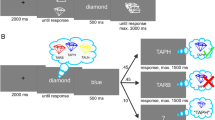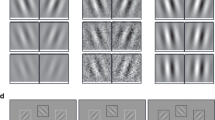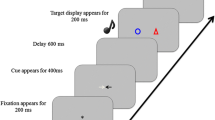Abstract
It has been found that a spatial cue in perception causes benefits through target facilitation at low external noise but noise reduction at high external noise. Assuming that mnemonic attention is similar to perceptual attention, we propose that how a spatial retro-cue is used depends on internal noise. To test this hypothesis, we manipulated internal noise with memory load. We focused on questioning whether/why there was a difference between peripheral and central retro-cues at low or high internal noise. In Experiments 1 and 2, we consistently found that peripheral retro-cues were more effective than central retro-cues at low internal noise. Results from Experiments 3–5 showed that this difference was due to a voluntary process of target facilitation, which happened much earlier on peripheral than central retro-cue trials. These findings are consistent with the hypothesis and indicated that mnemonic attention and perceptual attention could be incorporated into one framework. Nevertheless, spatial retro-cues, including peripheral ones, relied on voluntary control to become effective, different from peripheral cues in perception. To conclude, our findings suggest that the effects of spatial cues on memory and perception are similar but not identical.










Similar content being viewed by others
Data availability
The data that support the findings of this study are available in the OSF repository: https://osf.io/72h84/.
Code availability
The code that supports this study’s findings are available from the corresponding author upon reasonable request.
References
Astle, D. E., Summerfield, J., Griffin, I., & Nobre, A. C. (2012). Orienting attention to locations in mental representations. Attention, Perception, & Psychophysics, 74(1), 146–162. https://doi.org/10.3758/s13414-011-0218-3
Barth, A., & Schneider, D. (2018). Manipulating the focus of attention in working memory: Evidence for a protection of multiple items against perceptual interference. Psychophysiology, 55(7), e13062. https://doi.org/10.1111/psyp.13062
Berens, P. (2009). CircStat: a MATLAB toolbox for circular statistics. Journal of Statistical Software, 31(10), 34019. https://doi.org/10.18637/jss.v031.i10
Berryhill, M. E., Richmond, L. L., Shay, C. S., & Olson, I. R. (2012). Shifting attention among working memory representations: testing cue type, awareness, and strategic control. Quarterly Journal of Experimental Psychology, 65(3), 426–438. https://doi.org/10.1080/17470218.2011.604786
Briand, K. A. (1998). Feature integration and spatial attention: more evidence of a dissociation between endogenous and exogenous orienting. Journal of Experimental Psychology: Human Perception and Performance, 24(4), 1243–1256. https://doi.org/10.1037/0096-1523.24.4.1243
Busse, L., Katzner, S., & Treue, S. (2008). Temporal dynamics of neuronal modulation during exogenous and endogenous shifts of visual attention in macaque area MT. Proceedings of the National Academy of Sciences, 105(42), 16380–16385. https://doi.org/10.1073/pnas.0707369105
Carrasco, M. (2011). Visual attention: the past 25 years. Vision Research, 51(13), 1484–1525. https://doi.org/10.1016/j.visres.2011.04.012
Cheal, M. L., Lyon, D. R., & Hubbard, D. C. (1991). Does attention have different effects on line orientation and line arrangement discrimination? The Quarterly Journal of Experimental Psychology Section A, 43(4), 825–857. https://doi.org/10.1080/14640749108400959
Chen, H., & Wyble, B. (2018). The neglected contribution of memory encoding in spatial cueing: a new theory of costs and benefits. Psychological Review, 125(6), 936–968. https://doi.org/10.1037/rev0000116
Chica, A. B., Bartolomeo, P., & Lupiáñez, J. (2013). Two cognitive and neural systems for endogenous and exogenous spatial attention. Behavioural Brain Research, 237(1), 107–123. https://doi.org/10.1016/j.bbr.2012.09.027
Chica, A. B., Lasaponara, S., Lupiáñez, J., Doricchi, F., & Bartolomeo, P. (2010). Exogenous attention can capture perceptual consciousness: ERP and behavioural evidence. NeuroImage, 51(3), 1205–1212. https://doi.org/10.1016/j.neuroimage.2010.03.002
Corbetta, M., & Shulman, G. L. (2002). Control of goal-directed and stimulus-driven attention in the brain. Nature Reviews Neuroscience, 3(3), 201–215. https://doi.org/10.1038/nrn755
Cowan, N. (2001). The magical number 4 in short-term memory: a reconsideration of mental storage capacity. Behavioral and Brain Sciences, 24(1), 87–114. https://doi.org/10.1017/S0140525X01003922
Dosher, B. A., & Lu, Z.-L. (2000). Noise exclusion in spatial attention. Psychological Science, 11(2), 139–146. https://doi.org/10.1111/1467-9280.00229
Fleming, S. M., & Dolan, R. J. (2012). The neural basis of metacognitive ability. Philosophical Transactions of the Royal Society b: Biological Sciences, 367(1594), 1338–1349. https://doi.org/10.1098/rstb.2011.0417
Giordano, A. M., McElree, B., & Carrasco, M. (2009). On the automaticity and flexibility of covert attention: a speed-accuracy trade-off analysis. Journal of Vision, 9(3), 30–30. https://doi.org/10.1167/9.3.30
Gressmann, M., & Janczyk, M. (2016). The (Un)clear effects of invalid retro-cues. Frontiers in Psychology, 7(MAR), 1–12. https://doi.org/10.3389/fpsyg.2016.00244
Griffin, I. C., & Nobre, A. C. (2003). Orienting attention to locations in internal representations. Journal of Cognitive Neuroscience, 15(8), 1176–1194. https://doi.org/10.1162/089892903322598139
Gunseli, E., van Moorselaar, D., Meeter, M., & Olivers, C. N. L. (2015). The reliability of retro-cues determines the fate of noncued visual working memory representations. Psychonomic Bulletin & Review, 22(5), 1334–1341. https://doi.org/10.3758/s13423-014-0796-x
Harrison, S. A., & Tong, F. (2009). Decoding reveals the contents of visual working memory in early visual areas. Nature, 458(7238), 632–635. https://doi.org/10.1038/nature07832
Hopfinger, J. B., & West, V. M. (2006). Interactions between endogenous and exogenous attention on cortical visual processing. NeuroImage, 31(2), 774–789. https://doi.org/10.1016/j.neuroimage.2005.12.049
King, J. R., & Dehaene, S. (2014). Characterizing the dynamics of mental representations: the temporal generalization method. Trends in Cognitive Sciences, 18(4), 203–210. https://doi.org/10.1016/j.tics.2014.01.002
Kingstone, A., Smilek, D., Ristic, J., Friesen, C. K., & Eastwood, J. D. (2003). Attention, researchers! It is time to take a look at the real world. Current Directions in Psychological Science, 12(5), 176–180. https://doi.org/10.1111/1467-8721.01255
Kuo, B. C., & Astle, D. E. (2014). Neural mechanisms by which attention modulates the comparison of remembered and perceptual representations. PLoS ONE, 9(1), 34–39. https://doi.org/10.1371/journal.pone.0086666
Kurtz, P., Shapcott, K. A., Kaiser, J., Schmiedt, J. T., & Schmid, M. C. (2017). The influence of endogenous and exogenous spatial attention on decision confidence. Scientific Reports, 7(1), 1–9. https://doi.org/10.1038/s41598-017-06715-w
Lambert, A., Spencer, E., & Mohindra, N. (1987). Automaticity and the capture of attention by a peripheral display change. Current Psychology, 6(2), 136–147. https://doi.org/10.1007/BF02686618
Landman, R., Spekreijse, H., & Lamme, V. A. F. (2003). Large capacity storage of integrated objects before change blindness. Vision Research, 43(2), 149–164. https://doi.org/10.1016/S0042-6989(02)00402-9
LaRocque, J. J., Riggall, A. C., Emrich, S. M., & Postle, B. R. (2016). Within-category decoding of information in different attentional states in short-term memory. Cerebral Cortex. https://doi.org/10.1093/cercor/bhw283
Lau, H. C., & Passingham, R. E. (2006). Relative blindsight in normal observers and the neural correlate of visual consciousness. Proceedings of the National Academy of Sciences, 103(49), 18763–18768. https://doi.org/10.1073/pnas.0607716103
Lepsien, J., Griffin, I. C., Devlin, J. T., & Nobre, A. C. (2005). Directing spatial attention in mental representations: interactions between attentional orienting and working-memory load. NeuroImage, 26(3), 733–743. https://doi.org/10.1016/j.neuroimage.2005.02.026
Lepsien, J., & Nobre, A. C. (2006). Cognitive control of attention in the human brain: insights from orienting attention to mental representations. Brain Research, 1105(1), 20–31. https://doi.org/10.1016/j.brainres.2006.03.033
Lepsien, J., & Nobre, A. C. (2007). Attentional modulation of object representations in working memory. Cerebral Cortex, 17(9), 2072–2083. https://doi.org/10.1093/cercor/bhl116
Lepsien, J., Thornton, I., & Nobre, A. C. (2011). Modulation of working-memory maintenance by directed attention. Neuropsychologia, 49(6), 1569–1577. https://doi.org/10.1016/j.neuropsychologia.2011.03.011
Lewis-Peacock, J. A., Drysdale, A. T., Oberauer, K., & Postle, B. R. (2012). Neural evidence for a distinction between short-term memory and the focus of attention jarrod. Journal of Cognitive Neuroscience, 24(1), 61–79. https://doi.org/10.1162/jocn
Ling, S., & Carrasco, M. (2006). Sustained and transient covert attention enhance the signal via different contrast response functions. Vision Research, 46(8–9), 1210–1220. https://doi.org/10.1016/j.visres.2005.05.008
Liu, T., Stevens, S. T., & Carrasco, M. (2007). Comparing the time course and efficacy of spatial and feature-based attention. Vision Research, 47(1), 108–113. https://doi.org/10.1016/j.visres.2006.09.017
Lu, Z.-L., & Dosher, B. A. (1998). External noise distinguishes mechanisms of attention. Vision Research, 38(9), 1183–1198. https://doi.org/10.1016/B978-012375731-9/50078-1
Lu, Z.-L., & Dosher, B. A. (2000). Spatial attention: different mechanisms for central and peripheral temporal precues? Journal of Experimental Psychology: Human Perception and Performance, 26(5), 1534–1548. https://doi.org/10.1037/0096-1523.26.5.1534
Lu, Z.-L., Lesmes, L. A., & Dosher, B. A. (2002). Spatial attention excludes external noise at the target location. Journal of Vision, 2, 312–323. https://doi.org/10.1167/2.4.4
Makovski, T., & Jiang, Y. V. (2007). Distributing versus focusing attention in visual short-term memory. Psychonomic Bulletin & Review, 14(6), 1072–1078. https://doi.org/10.3758/BF03193093
Makovski, T., & Pertzov, Y. (2015). Attention and memory protection: interactions between retrospective attention cueing and interference. The Quarterly Journal of Experimental Psychology, 68(9), 1735–1743. https://doi.org/10.1080/17470218.2015.1049623
Makovski, T., Sussman, R., & Jiang, Y. V. (2008). Orienting attention in visual working memory reduces interference from memory probes. Journal of Experimental Psychology: Learning, Memory, and Cognition, 34(2), 369–380. https://doi.org/10.1037/0278-7393.34.2.369
Matsukura, M., Cosman, J. D., Roper, Z. J., Vatterott, D. B., & Vecera, S. P. (2014). Location-specific effects of attention during visual short-term memory maintenance. Journal of Experimental Psychology: Human Perception and Performance, 40(3), 1103–1116. https://doi.org/10.1037/a0035685
Meijs, E. L., Klaassen, F. H., Bokeria, L., van Gaal, S., & de Lange, F. P. (2018). Cue predictability does not modulate bottom-up attentional capture. Royal Society Open Science, 5(10), 180524. https://doi.org/10.1098/rsos.180524
Myers, N. E., Stokes, M. G., & Nobre, A. C. (2017). Prioritizing information during working memory: beyond sustained internal attention. Trends in Cognitive Sciences, 21(6), 449–461. https://doi.org/10.1016/j.tics.2017.03.010
Oberauer, K., & Lin, H.-Y. (2017). An interference model of visual working memory. Psychological Review, 124(1), 21–59. https://doi.org/10.1037/rev0000044
Pertzov, Y., Bays, P. M., Joseph, S., & Husain, M. (2013). Rapid forgetting prevented by retrospective attention cues. Journal of Experimental Psychology: Human Perception and Performance, 39(5), 1224–1231. https://doi.org/10.1037/a0030947
Pertzov, Y., Manohar, S., & Husain, M. (2017). Rapid forgetting results from competition over time between items in visual working memory. Journal of Experimental Psychology: Learning, Memory, and Cognition, 43(4), 528–536. https://doi.org/10.1037/xlm0000328
Posner, M. I. (1978). Chronometric explorations of mind. Lawrence Erlbaum.
Posner, M. I. (1980). Orienting of attention. Quarterly Journal of Experimental Psychology, 32(1), 3–25. https://doi.org/10.1080/00335558008248231
Remington, R. W., Johnston, J. C., & Yantis, S. (1992). Involuntary attentional capture by abrupt onsets. Perception & Psychophysics, 51(3), 279–290. https://doi.org/10.3758/BF03212254
Rose, N. S., LaRocque, J. J., Riggall, A. C., Gosseries, O., Starrett, M. J., Meyering, E. E., & Postle, B. R. (2016). Reactivation of latent working memories with transcranial magnetic stimulation. Science, 354(6316), 1136–1139. https://doi.org/10.1126/science.aah7011
Sahan, M. I., Verguts, T., Boehler, C. N., Pourtois, G., & Fias, W. (2016). Paying attention to working memory: similarities in the spatial distribution of attention in mental and physical space. Psychonomic Bulletin and Review, 23(4), 1190–1197. https://doi.org/10.3758/s13423-015-0990-5
Schneider, D., Göddertz, A., Haase, H., Hickey, C., & Wascher, E. (2019). Hemispheric asymmetries in EEG alpha oscillations indicate active inhibition during attentional orienting within working memory. Behavioural Brain Research, 359, 38–46. https://doi.org/10.1016/j.bbr.2018.10.020
Shepherdson, P., Oberauer, K., & Souza, A. S. (2018). Working memory load and the retro-cue effect: a diffusion model account. Journal of Experimental Psychology: Human Perception and Performance, 44(2), 286–310. https://doi.org/10.1037/xhp0000448
Shimi, A., Nobre, A. C., Astle, D., & Scerif, G. (2014). Orienting attention within visual short-term memory: development and mechanisms. Child Development, 85(2), 578–592. https://doi.org/10.1111/cdev.12150
Souza, A. S., & Oberauer, K. (2016). In search of the focus of attention in working memory: 13 years of the retro-cue effect. Attention, Perception, & Psychophysics, 78(7), 1839–1860. https://doi.org/10.3758/s13414-016-1108-5
Souza, A. S., Rerko, L., & Oberauer, K. (2014). Unloading and reloading working memory: attending to one item frees capacity. Journal of Experimental Psychology: Human Perception and Performance, 40(3), 1237–1256. https://doi.org/10.1037/a0036331
Souza, A. S., Rerko, L., & Oberauer, K. (2016). Getting more from visual working memory: retro-cues enhance retrieval and protect from visual interference. Journal of Experimental Psychology: Human Perception and Performance, 42(6), 890–910. https://doi.org/10.1037/xhp0000192
Sprague, T. C., Ester, E. F., & Serences, J. T. (2016). Restoring latent visual working memory representations in human cortex. Neuron, 91(3), 694–707. https://doi.org/10.1016/j.neuron.2016.07.006
Trübutschek, D., Marti, S., Ojeda, A., King, J. R., Mi, Y., Tsodyks, M., & Dehaene, S. (2017). A theory of working memory without consciousness or sustained activity. eLife, 6, 1–29. https://doi.org/10.7554/eLife.23871
van Moorselaar, D., Battistoni, E., Theeuwes, J., & Olivers, C. N. L. (2015). Rapid influences of cued visual memories on attentional guidance. Annals of the New York Academy of Sciences, 1339(1), 1–10. https://doi.org/10.1111/nyas.12574
Wallis, G., Stokes, M., Cousijn, H., Woolrich, M., & Nobre, A. C. (2015). Frontoparietal and cingulo-opercular networks play dissociable roles in control of working memory. Journal of Cognitive Neuroscience, 27(10), 2019–2034. https://doi.org/10.1162/jocn_a_00838
Wolff, M. J., Jochim, J., Akyürek, E. G., & Stokes, M. G. (2017). Dynamic hidden states underlying working-memory-guided behavior. Nature Neuroscience, 20(6), 864–871. https://doi.org/10.1038/nn.4546
Yantis, S., & Jonides, J. (1990). Abrupt visual onsets and selective attention: voluntary versus automatic allocation. Journal of Experimental Psychology: Human Perception and Performance, 16(1), 121–134. https://doi.org/10.1037/0096-1523.16.1.121
Zokaei, N., Burnett Heyes, S., Gorgoraptis, N., Budhdeo, S., & Husain, M. (2015). Working memory recall precision is a more sensitive index than span. Journal of Neuropsychology, 9(2), 319–329. https://doi.org/10.1111/jnp.12052
Acknowledgements
We thank Yichen Wang, Yuhang Li, and Yajing Wang for their experimental assistance. We thank Dr. Klaus Oberauer and Dr. Alessandra Souza for their comments on the manuscript. We also thank editor and reviewers for their valuable comments and suggestions. This work was supported by the National Social Science Foundation of China (17ZDA323), the Shanghai Committee of Science and Technology (19ZR1416700, 17JC1404101, 17JC1404105), and the NYU-ECNU Institute of Brain and Cognitive Science at NYU.
Funding
This work was supported by the National Social Science Foundation of China (17ZDA323), the Shanghai Committee of Science and Technology (19ZR1416700, 17JC1404101, 17JC1404105), and the NYU-ECNU Institute of Brain and Cognitive Science at NYU.
Author information
Authors and Affiliations
Contributions
SH and YK designed the study, SH performed experiments, SH analyzed data, SH and YK wrote the article.
Corresponding author
Ethics declarations
Conflict of interest
The authors declare that they have no conflict of interest to disclose.
Consent to participate
Informed consent was obtained from all individual participants included in the study.
Consent for publication
Patients signed informed consent regarding publishing their data and photographs.
Additional information
Publisher's Note
Springer Nature remains neutral with regard to jurisdictional claims in published maps and institutional affiliations.
Rights and permissions
About this article
Cite this article
Han, S., Ku, Y. Mnemonic attention in analogy to perceptual attention: harmony but not uniformity. Psychological Research 86, 1274–1296 (2022). https://doi.org/10.1007/s00426-021-01556-9
Received:
Accepted:
Published:
Issue Date:
DOI: https://doi.org/10.1007/s00426-021-01556-9




